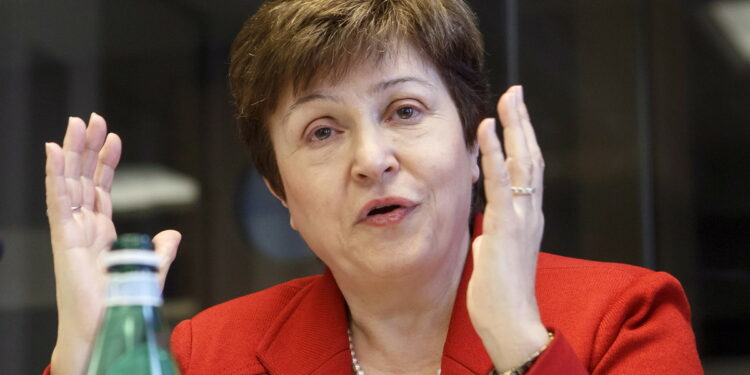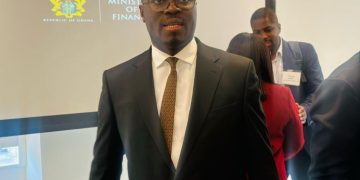Toward a New Economic Order: IMF Calls for Trust-Building and Reform
- Global Trade Reset Tests Fragile Growth as IMF Urges Bold Policy Realignment
In a climate of rising protectionism, volatile markets, and waning trust in global institutions, the Managing Director of the International Monetary Fund, Kristalina Georgieva, has issued a sobering yet solution, driven call for reform to avert what she calls “a boiling point” in the global trading system.
Addressing global finance ministers and central bankers at the IMF’s Curtain Raiser ahead of the Spring Meetings, Georgieva underscored that while the world economy has demonstrated resilience in the face of shocks, this durability is now under severe strain due to a growing fragmentation of trade, fiscal imbalances, and political tensions.
“We live in a world of sudden and sweeping shifts,” she warned. “And it is a call to respond wisely.”
Fraying Trust and Rising Barriers
Georgieva painted a picture of an international system grappling with self-inflicted wounds. Years of simmering dissatisfaction over trade inequities have erupted into retaliatory tariffs and industrial policy races that threaten to undo decades of integration.
The data provides significant insights. Effective tariff rates in the United States are now at levels not seen in generations, subsidy measures are proliferating across jurisdictions, and financial market uncertainty has surged to post-pandemic highs. These shifts, she argues, stem from a breakdown in trust—between countries and in the global economic system itself.
“In a multipolar world, where things are made may matter more than how much they cost,” Georgieva noted, referencing the rise in national security-driven trade policies that prioritise self-reliance over efficiency.
Shockwaves for the Global South
While advanced economies spar over chips and subsidies, it is smaller nations and emerging markets that bear the brunt. With limited domestic demand, these economies are disproportionately exposed to shifts in trade flows and tightening financial conditions.
Georgieva warned of deepening vulnerabilities in low-income countries, where collapsing aid flows and fragile debt profiles compound economic stress. These nations now face the impossible trilemma of supporting growth, stabilising prices, and servicing debt, often without external help.
The IMF’s forthcoming World Economic Outlook, Georgieva hinted, will show revised growth downwards and inflation up, particularly where trade frictions persist. Importantly, she cautioned, uncertainty itself is becoming a macroeconomic headwind, chilling investment and fuelling market volatility.
Turning Crisis into Course Correction
Despite these headwinds, Georgieva insists that meaningful reforms, both national and collective, can deliver a more balanced, more resilient global economy. She called on countries to:
- Rebuild fiscal buffers through credible consolidation plans;
- Preserve monetary independence and inflation-fighting credibility;
- Advance structural reforms in areas such as banking, competition policy, and digital infrastructure;
- Enhance productivity to compensate for demographic headwinds and global fragmentation.
“In a world of higher uncertainty and frequent shocks, there is no room for delay in reforms,” she emphasized.
Importantly, she noted that 48 countries are currently under IMF-supported programmes, including Argentina, showing both the scale of global distress and the demand for institutional support.
Macro Rebalancing and Global Dialogue
Georgieva called for renewed attention to global imbalances—both internal (savings vs. investment) and external (current account surpluses and deficits). She urged major economies to lead by example:
- China, by stimulating domestic consumption and dialing back industrial overreach;
- The EU, by launching bold fiscal and market integration initiatives;
- The US, by reducing its outsized fiscal deficit to ease global financial pressures.
Her appeal was not just for macroeconomic calibration but for political will. “Resilience requires that attention be paid to policies to cushion the blows on those who lose out,” she said, calling for equitable distribution mechanisms as a bridge between beneficial economics and social stability.
A New Compact for Global Resilience
As the IMF prepares to convene 191 member states, Georgieva framed the moment as one of rare historical clarity: a fork in the road where inaction risks entrenching division, while collaboration could yield renewal.
“With cool heads, clear vision, and strong will, times of change can be times of renewal,” she concluded. “The secret to seizing the moment is to focus all energy not on preserving the old but on building the new.”
For now, the old order continues to fray. Whether the Spring Meetings will deliver concrete steps toward rebuilding trust and openness or simply serve as a forum for polite disagreement remains to be seen. But the IMF’s message is clear: global stability is not a given, and time is running out to act.








